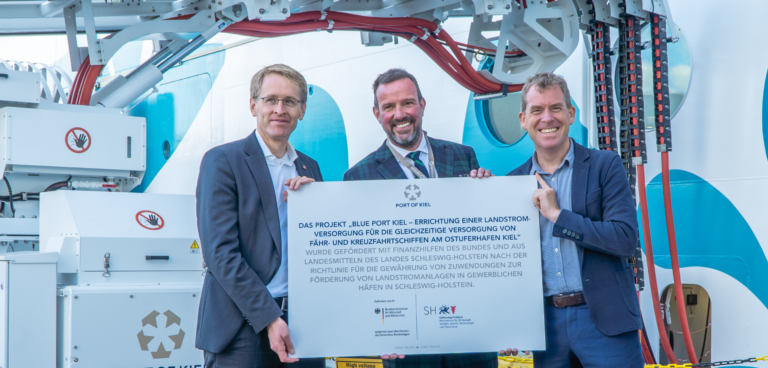The Port of Kiel in Germany has opened two shore power systems at the Ostuferhafen ferry terminal, including a 50-60Hz shore power system for cruise ships and ferry ships and a 50Hz shore power system for ferry ships.
The €17m (US$18m) construction project at the Ostuferhafen includes two shore power plants with the ability to supply up to three sea ships in parallel. The first of the two shore power systems has been designed for the supply of a ferry and a cruise ship. The system connects four berths at the east bank port to shore power. It has an output of 16MVA and can handle cruise and ferry ships with a frequency of 50-60Hz and a voltage of 6.6kV or 11kV. The second shore power system, with a 50Hz grid frequency, has been designed exclusively for ro-ro ships and supplies two berths with a voltage of 6.6kV or 11kV up to a maximum power of 5MVA.
The expansion of the shore power infrastructure is one of the prioritized projects of the Kiel Seaport to reduce CO2 emissions as well as air/emissions of the ships during berth. After the opening of the first shore power system at the Norwegenkai with an output of 4.5MVA, 50HZ, 10kV in 2019, followed in 2021 by the opening of a combined plant for supplying cruise ships at the Ostseekai (16MVA, 50-60Hz, 6.6/11kV) and ferry ships at the Schwedenkai (5MVA, 50-60HZ, 6.6/11kV).
According to the Cruise Lines International Association (CLIA) only 2% of ports worldwide currently offer shore-based power supply to cruise ships – unlike the Port of Kiel. Around half of the ferry and cruise ships at the port in 2023 have been supplied with shore power via the already existing shore power systems. For the shore power supply of the seagoing ships, the company uses Scandinavian green electricity.
These systems were supported in equal parts by federal funds from the federal government and the state of Schleswig-Holstein. Schleswig-Holstein Prime Minister Daniel Günther handed over the grant notice of €11m (US$11.6m) to Dirk Claus, the managing director of port operating company Seehafen Kiel, as part of the opening and in the presence of Kiel’s mayor, Ulf Kämpfer.
The necessary commissioning of the system for cruise ships has already begun.
Günther said, “The construction of the two new shore power systems at the seaport shows that our ports are progressing. With every planned, subsidized and built facility, the seaport of Kiel implements its Blue Port strategy and continues to move towards climate neutrality. With almost €5.5m (US$5.8m) each, the state and the federal government are also investing at the same time in sensible solutions that make maritime transport more environmentally friendly and in a location factor in competition with other ports.”
Mayor Kämpfer said, “I’m pleased that the Port of Kiel is continuing its stringent shore power strategy with the construction of the facilities at the Ostuferhafen. Since 2019, the Kiel Seaport has been continuously investing in the expansion of the shore power infrastructure. We now have one of the largest facilities in Europe. Kiel wants to continue to be a pioneer in sustainable maritime tourism and mobility in the future. Today is a real milestone.”
Claus said, “For us, the shore power systems are another important step on our way to saving CO2 emissions in the port of Kiel. By 2030 at the latest, we want to supply all ships at our berths with greenshore power. For the coming season, we plan to supply 40 cruises alone via the newly opened facility at the Ostuferhafen, another 60 trips will be at the Ostseekai.”
In the next few years, Kiel will be the home port for the latest flagship of MSC Cruises, the MSC Euribia. The energy-efficient cruise ship will be the first ship to take shore power at the east bank port. Christian Hein, managing director of MSC Cruises Germany, said at the opening, “The shore power supply of our ships is an important element of our environmental efforts. By significantly reducing emissions in the ports, we meet our environmental responsibility toward the ports and destinations. Together with the use of LNG as fuel, improving energy efficiency, the use of innovative wastewater treatment and waste recycling, we are taking an important step to further reduce our impact on the environment.”
Like the already existing shore power plants at the Norwegenkai and Schweden-/Ostseekai, the new plants at the Ostuferhafen were also built by Siemens. Markus Mildner, CEO of eMobility Siemens Smart Infrastructure, stated, “I am pleased that the seaport of Kiel has relied on us as a strong partner in recent years. Kiel is one of the first ports in the world with a nationwide shore power supply at all cruise and ferry terminals. And all shore power systems come from Siemens. It makes me proud that we can support the Port of Kiel with our solutions in the implementation of its sustainability strategy.”
The construction project was realized through funding with federal financial assistance in accordance with Article 104b of the Basic Law and from state funds in accordance with point 44 of the state budget code of the state of Schleswig-Holstein, in accordance with the directive for the granting of grants for the promotion of shore power plants in commercial ports in Schleswig-Holstein.



